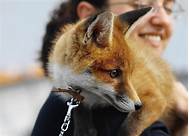Can You Own a Fox as a Pet?
With their sleek fur, bushy tails, and piercing eyes, it's no wonder that many people find foxes fascinating and endearing creatures. However, before you rush out to adopt one of these wild animals as a pet, it's crucial to understand the implications and challenges associated with fox ownership.

Foxes as Wild Animals
Foxes are wild animals, and their instincts are inherently different from those of domesticated pets like dogs and cats. They are predators with keen senses, sharp teeth, and a strong prey drive. These natural traits can make them unpredictable and potentially dangerous, especially if they feel threatened or stressed.
Additionally, foxes have a strong wanderlust and a large home range. They are curious and adventurous creatures that need ample space to roam, explore, and hunt. Confining them to a small apartment or backyard can lead to frustration, boredom, and destructive behavior.
Legal and Ethical Concerns
In many countries and states, it is illegal to own a fox as a pet. These laws are in place for a reason, as foxes are not suitable companions for most people. Even in areas where fox ownership is permitted, there are often strict regulations that must be followed, such as obtaining a permit, providing adequate housing, and vaccinating the animal regularly.
Beyond the legal implications, there are also ethical concerns to consider. Foxes are wild animals that have evolved to live in their natural habitats. Taking them away from their natural environment and forcing them to adapt to a human lifestyle can be cruel and inhumane.
Challenges of Fox Care
Even if you live in an area where fox ownership is legal and you have the necessary permits, there are significant challenges associated with caring for a fox as a pet.
Foxes have specialized dietary needs and require a diet that mimics their natural prey. This often includes a combination of meat, fruits, vegetables, and insects. Providing a balanced and nutritious diet can be time-consuming and expensive.
Furthermore, foxes require a large and secure enclosure that allows them to express their natural behaviors, such as running, climbing, and digging. Creating an appropriate habitat for a fox can be costly and requires a significant amount of space.
Alternatives to Fox Ownership
If you are passionate about foxes and want to learn more about these fascinating creatures, there are several alternative ways to do so:
- Visit a wildlife sanctuary or zoo that specializes in foxes.
- Support organizations that work to protect foxes and their habitats.
- Educate yourself and others about the importance of fox conservation.
- Consider adopting a domesticated pet, such as a dog or cat, that is better suited for living in a human household.
By choosing responsible and ethical alternatives, you can still appreciate foxes without contributing to the demand for exotic pets and the potential harm it causes to these wild animals.
Declaration: All article resources on this website, unless otherwise specified or labeled, are collected from online resources. If the content on this website infringes on the legitimate rights and interests of the original author, you can contact this website to delete it.





